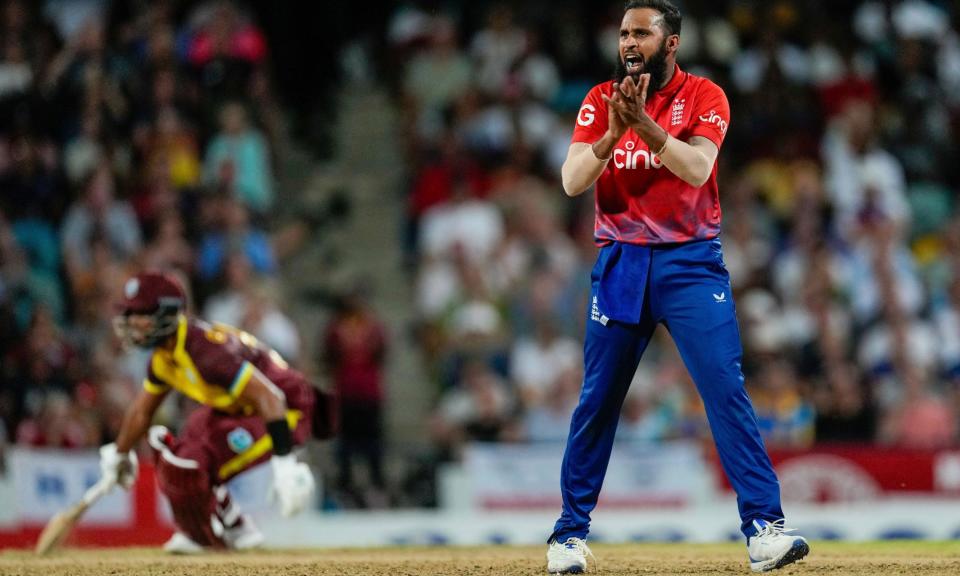‘Just part and parcel of sport’: Adil Rashid shrugs off England’s losing habit

As England come to terms with a third defeat in the first four games of their West Indies tour, Adil Rashid says he is relaxed about the prospect of his once all-conquering side bumping along the cricketing seabed for a while. He considers it an inevitable part of the sporting cycle that, in the end, even winners lose.
“That’s fine, that happens,” Rashid said. “You can’t always win World Cups, you can’t win series every time. Obviously, we’d love to do that but it’s part and parcel of sport, not just cricket, in football – you see the best in the world, one minute they win a World Cup, the next minute they lose.
Related: Usman Khawaja vows to fight ICC mandate after shoe slogan ban
“We’ve still got belief in ourselves. All we’ve got to do is go out there and have that self-belief, stick to our process and just play the game. But I’m not concerned. You win some, you lose some.”
The problem is that England are losing many. With Eoin Morgan as captain they won 60% of their games and lost 34%, but since Jos Buttler took permanent charge in June last year, and despite securing a T20 World Cup in that time, England’s win percentage has dropped to 44%, and defeats rocketed to 52%. They have got into the losing habit.
Rashid insists no complacency crept into a group that won World Cups in both formats in the space of three years and is only now, after their failure at the World Cup in India this year, being significantly reconfigured. “Every time you win a World Cup you put it behind you and you want to win the next one,” he said.
“It’s not a thing of, ‘We won a World Cup and it’s fine.’ No, you put it behind you, you move on to win the next and the next. You go out there giving 100% with the mind and the heart, and if you fall short you’ve got no one to blame.”
After losing their one-day international series against West Indies 2-1 England are one down in the five-game T20 series that started on Tuesday in Barbados and continues in Grenada on Thursday. In the opener, their vaunted batting depth turned shallow, the final five wickets falling in 14 balls for the addition of six runs to leave them with an underwhelming total of 171. West Indies proceeded to blow them away with a barrage of sixes – 49% of their runs came from them – as they cantered to victory by four wickets with 11 balls remaining.
England used the game as an opportunity to experiment with a spin‑heavy side, picking, in addition to two spinning all-rounders, two specialist leg-spinners in Rashid and Rehan Ahmed. The latter pair took five of the six wickets to fall while also proving less expensive than seam. If the approach continues to be successful England are likely to follow the template, at least in some venues, when they return to the Caribbean in June for the T20 World Cup.
Related: The Spin | ‘A bucket-list thing’: England’s women relish first Test in India for 18 years
“That’s way down the line, there’s a lot of cricket yet to be played for myself and Reh,” said Rashid, who on Tuesday crowned his 100th T20 international with his 100th wicket. “We’re going to keep coming out, try to do our thing, do the best we can and leave the rest to the selectors. We’re playing in these conditions where we would be playing, so it’s about adapting, finding people’s roles and a way to combat certain skills. Hopefully, by the time we get to the World Cup we can be peaking as a team and a squad.”
The other notable experiment on Tuesday was the stop clock, which gives fielding teams a maximum of 60 seconds after the end of an over to be ready to start the next. Beyond the sight of Nicholas Pooran, the West Indies wicketkeeper, sprinting between overs it had little obvious impact and neither team roused the umpires’ ire.
Long before the end, organisers had ceased putting the countdown on Kensington Oval’s big screen between each over. “It didn’t have as much impact as I thought it might,” Buttler said. “When I was batting everyone seemed to be in place with only about 30 seconds gone.”

